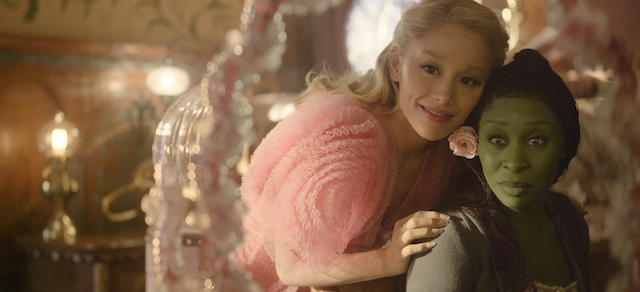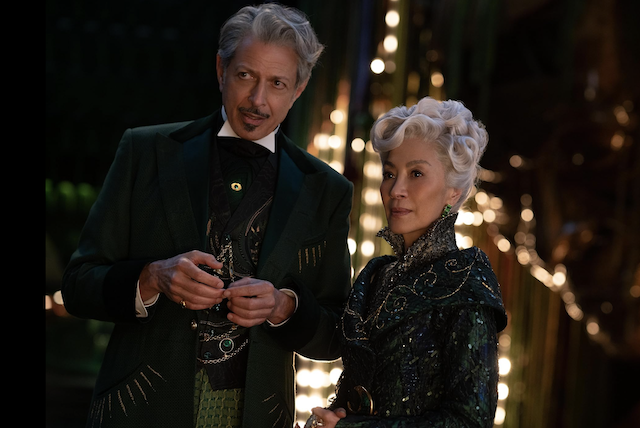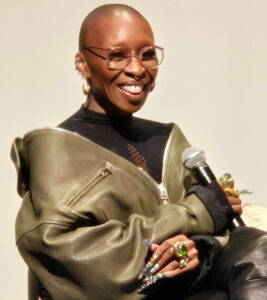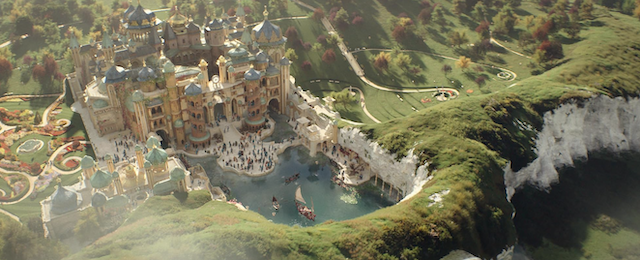
@Courtesy of Universal Pictures
Wicked : Wicked, the untold story of the witches of Oz, stars Emmy, Grammy and Tony winning powerhouse Cynthia Erivo (Harriet, Broadway’s The Color Purple) as Elphaba, a young woman, misunderstood because of her unusual green skin, who has yet to discover her true power, and Grammy-winning, multi-platinum recording artist and global superstar Ariana Grande as Glinda, a popular young woman, gilded by privilege and ambition, who has yet to discover her true heart. The two meet as students at Shiz University in the fantastical Land of Oz and forge an unlikely but profound friendship. Following an encounter with The Wonderful Wizard of Oz, their friendship reaches a crossroads and their lives take very different paths. Glinda’s unflinching desire for popularity sees her seduced by power, while Elphaba’s determination to remain true to herself, and to those around her, will have unexpected and shocking consequences on her future. Their extraordinary adventures in Oz will ultimately see them fulfill their destinies as Glinda the Good and the Wicked Witch of the West.
Director : Jon M. Chu
Producer : Marc Platt, David Stone
Screenwriter : Winnie Holzman, Dana Fox
Distributor : Universal Pictures
Production Co : Marc Platt Productions
Rating : PG (Some Scary Action|Brief Suggestive Material|Thematic Material)
Genre : Kids & Family, Musical, Fantasy, Adventure
Original Language : English
Release Date (Theaters) : Nov 22, 2024, Wide
Release Date (Streaming) : Dec 31, 2024
Runtime : 2h 40

©Courtesy of Universal Pictures
Q&A with Cynthia Erivo Moderated by Jessica Chastain
Jessica Chastain: We’ve known each other for a while, and I have to tell you: as soon as I saw this film, I was so incredibly moved by what you did in this performance. I know you’ve worked both on stage and now on film. Can you talk to me about the different process from making a musical live performance to creating a film?
Cynthia Erivo: When you’re on stage, you have the immediacy of the eight-shows week process. You’re performing six days a week, eight shows a week, which means you’re essentially training constantly to make sure that you can sustain that amount. And when you’re on a stage, you can be in a place that holds up to 2,000 people, and those 2,000 people can be from the ground right up into the ceiling. The energy that you’re using has to be sent in a direction that the person at the very back of the very top of the theatre also receives it. You want to be able to make sure that whoever is up there, since they pay to see it too, you want to make sure that they also receive what you’re giving from the stage. When you’re doing it for film, everyone can be right here in your eyes.
What’s going on inside can be just loud enough for the camera to catch. It can be much quieter than it is when you’re standing on a stage and doing it live. For the singing of it, all we sang live. It was an ongoing training because we were using different parts of ourselves. You can do the same take 20 times depending on what’s necessary, because there are loads of technical things going on.
Maybe Alice Brooks, our cinematographer, just needs to sync up with our first camera because there’s movement going on. We have to do it until everything sticks up and we keep that perfect take, so there’s a lot more patience in capturing it on camera, but the energy is still true both on stage and on camera. As long as it’s coming from the most truthful place. I’ll do the same thing on stage as I do it on screen not because the camera’s there but because that’s what means the most, that’s what makes the most sense and is the most truthful.
Jessics Chastain: I’ve sung live in George and Tammy, I know how difficult it is. What you have done, flipping all around and singing live, it makes so much sense why I was so incredibly moved: you weren’t just standing there, you felt the stress on your body, it channeled in what you were singing live. Can you talk about the stunts?
Cynthia Erivo: It took a lot of training. Jo McClaren, our stunt coordinator, had a heart attack when I said to her: “I would like to do my stunts. Can you help me because I’m also gonna be singing live?” My wonderful vocal coach and Jo helped me get to a place where my body was used to the movement. I had to train to make sure the vocal was going to be used for the stunts, the harness, the corset, the wires, because all of that moves your body in a way that you can’t really prepare for until you get there. Then you put singing into place. Now the practical side of singing is this: You need your lungs and you need your breath to make the sound.
Usually you use the diaphragm to make big sounds. When you’re wearing a corset and a wire you can’t use your diaphragm because it’s restricted. So you would send the breath into the lungs, that’s what would give you the support and usually the musculature around your body. So when your lungs are slightly restricted, we only use the front part of our lungs when we breathe in, we call it catch breath. But when you need lots of air you learn to make your breath go into your back and sides.
That’s actually the full capacity of breathing. We have small little pieces of muscles in between the bones that make up our ribcage. They stretch. So when you take a full breath, you can feel that it’s really big. There’s loads of air and you can go for ages and ages without taking a breath, you can keep speaking or singing or making a really loud sound without needing to take breath. For that big sound that comes out in the end, you usually need the ground or gravity. I didn’t have gravity, literally. So what we did was to find a way to imagine that the ground was beneath us.
You send the energy into the muscles around the body, you put tension into the muscles of the legs, they push back on you. You put tension in the muscles, in your arms, in your chest and your back. Then it gives you the pressure that you need in order to make those sounds. It’s like creating gravity, creating ground without it. I wanted to feel like I could fly when I was doing it because it made sense for her to know what it feels to be in flight, to be able to sing it and mean it. I was willing to do whatever was necessary to make sure that the sound came out and it felt like it was meant because I did. You do what your body needs and you find the way to to get that sound the way you need it to be.

@Courtesy of Universal Pictures
Jessica Chastain: Sometimes I find that in these films the singing overrides the performance. Watching your performance, I never felt like: “Okay, here’s the song happening.” I always felt I was on your journey with you, which is a huge gift because there’s a lot of great singers out there, but not a lot of great singers/actors. Talk to me about creating Elphaba: there’s this legacy of so many incredible artists who’ve played her, what do you do? Did you try to close your eyes to it? Did you try to create your own? Did you take in the history of the Elphabas?
Cynthia Erivo: It’s impossible to ignore the Elphabas that have come before, especially Idina Menzel and Kristin Chenoweth, who created this from the beginning. You don’t want to erase the work that they’ve done. You do want to pay homage to it but you also don’t want to slip into mimicking because that actually doesn’t respect the work that they’ve done at all. I knew that I didn’t need to try to make it different, I just knew it would end up being different because it was in my body, coming from my mind.
It would have to be filled with my experiences and my truth. Elphaba inevitably knows what it feels like to be different, feel different. I also know what it feels like to be different, feel different, experience shame, experience embarrassment, not feel like you are included. But what I have experienced is going to be different to what everyone else experiences. I just wanted to channel all of those feelings, experiences through this version of Elphaba.
That makes her different because she comes from me. The intention is just to tell the truth of what I know as Cynthia and what I understand in my life to move through her. She needs to come to life, the focus for me maybe is different from the focus of the other Elphabas, everyone has their own little thing. I really wanted Elphaba to have joy and vulnerability. I don’t think she expects people to let her down all the time. I think she always can see the good in people, so has always got this edge of hope and joy in her.
Jessica Chastain: I also feel that quite often musicals or big-budget films can actually not feel very personal. In this case I was so moved by what you did in the ballroom sequence, your performance is so fragile, so subtle and open. There’s a vulnerability that I found so incredibly beautiful and surprising in a film this size. Can you talk to me about the creation of that sequence?
Cynthia Erivo: Christopher Scott and Will Loftis choreographed a piece for this and they showed it to me when I went in to start rehearsals. It was really lovely but it didn’t feel like it was her language. So I asked if we could create a piece that felt like Elphaba’s language. Paul Tazewell, the costume supervisor and creator of all wonderful things that you see on anyone’s body in this world, told me that Elphaba is the sharp edge in us, and I believe the same of her. If you look at her, she’s all angles, all triangles, all squares, all points. The movement they had created was so soft and lyrical, I think she speaks a different language and I wanted to figure out what stops her from leaving after she’s been so embarrassed and so rejected in the ballroom.
If she’s staying, there’s a decision that she makes to be okay with being alone. To reclaim the space that was taken from her. Why does she put the hat back on again? What if this dance is the first time she tries a spell, to make sure that that thing that caused her pain actually becomes the thing that is a source of power for her? All those things wrapped up in that dance.
Then I had to be brave enough to open up to her loss, pain, shame and rejection. I was afraid to look at it, but I knew it was important because you can’t do this dance unless you’re open to feeling all of that. So I just let myself feel all of those things. Ariana hadn’t learned that choreography. I had shown it to her maybe twice before so when we’re doing that dance together, she is actually learning from me. We are mirroring each other. Those are real emotions that you’re watching, that’s a real moment for both of us.

@Courtesy of Adriano Ercolani
Jessica Chastain: How long did you work on Wicked?
Cynthia Erivo: I was cast in 2021. We started rehearsals in August 2022. We started shooting in December 2022. We shot all the way through 2023 up until July. Then the strike happened. Six months of waiting in between. We came back at the top of this year in January and the last thing I shot was Define Gravity. We finished it in February. There is nothing like holding onto a character for six months to make you appreciate how much a piece means to you. The fear that Elphaba might not be there anymore was just an insane experience because you don’t really know. But then you get back on set and she just shows up. That was really, really cool.
Jessica Chastain: Can you talk to me about the physical transformation of finding her? How long was it and what was your day like?
Cynthia Erivo: My day usually started at about 2 or 2:30 am. I would work out for an hour or two in the morning, I’d get ready, and then my pickup was usually about 4:30 or 5am o ‘clock on a normal day. My makeup would take anything from 2 hours and 45 minutes to four hours, depending on how much green we would do. Then we would shoot for 12 hours per day. Then I would take another hour and a half to take it all off before I went back home. But I asked for it. I needed it. I wanted the transformation. I wanted to be able to look into a mirror and see the green lady staring back at me. I wanted that because it meant that everything felt real.
The green that they use on the other Elphabas didn’t work on my skin tone. It had the wrong tone in it. It had pink or sometimes white undertones in the green. So when it was on me, it was chalky. But my makeup artists went and found a green for me. I think it ended up being called Cynthia’s Green. It has a yellow highlighter undertone in it, so when it’s on my skin it looks like my skin. I should mention the first time I went completely bald was for Wicked. I shaved my head because it was the only way to make sure that my scalp was green. And I stuck with it because I liked how it felt.
I wanted her to feel three-dimensional. I wanted her to feel like a real person. The nails were a thing that I loved. But I did my research and realised that the original Wicked Witch of the West, Margaret Hamilton, had nails. For the eyes we found this very generic green contact lens that worked. So it was about finding all these things that allow you to come in close enough.We spent a long time creating this person. The braids were a particular love of mine. It was the one thing I wanted from the very beginning because it connected Elphaba with who I am as a black woman. So you get the marriage of two worlds into one.
Q : You explained very well your process about Wicked, but in every movie or series I’ve seen you, you’ve been able to create a very specific, very personal energy for your characters, something that informs the body language. How do you approach characters thinking about their body language?
Cynthia Erivo: I love working from the physical. I’m a very physical human being. I’m very connected to my body. Body language tells you a lot about who the person is. Shoes always help me because of how they make a person walk. It’s about trying to find out what’s the ultimate goal for a person. Elphaba wants to be loved, but she has her guard up. There’s a little attitude in it. It’s like: “Stay away just far enough. I need my space.” And there’s a little bit of annoyance. Holly innThe Outsider is confused and feels awkward, has business to do so she moves like she has somewhere to be. Harriet was a person who had skills but was not trained, so she moves wildly until she becomes a free woman and then it’s forward, up straight. It’s about finding out what they want, what they need. We speak body language, all of us do, before we say something. Often it’s what the a person’s body is doing, more than what the words are saying. I like to figure out what that is. I really enjoy that. It’s like one of my favorite things to do. It’s speaking without speaking.

@Courtesy of Universal Pictures
If you liked the Q & A, share your thoughts below.
Check out more of Adriano’s articles.
Here’s the trailer for Wicked:

